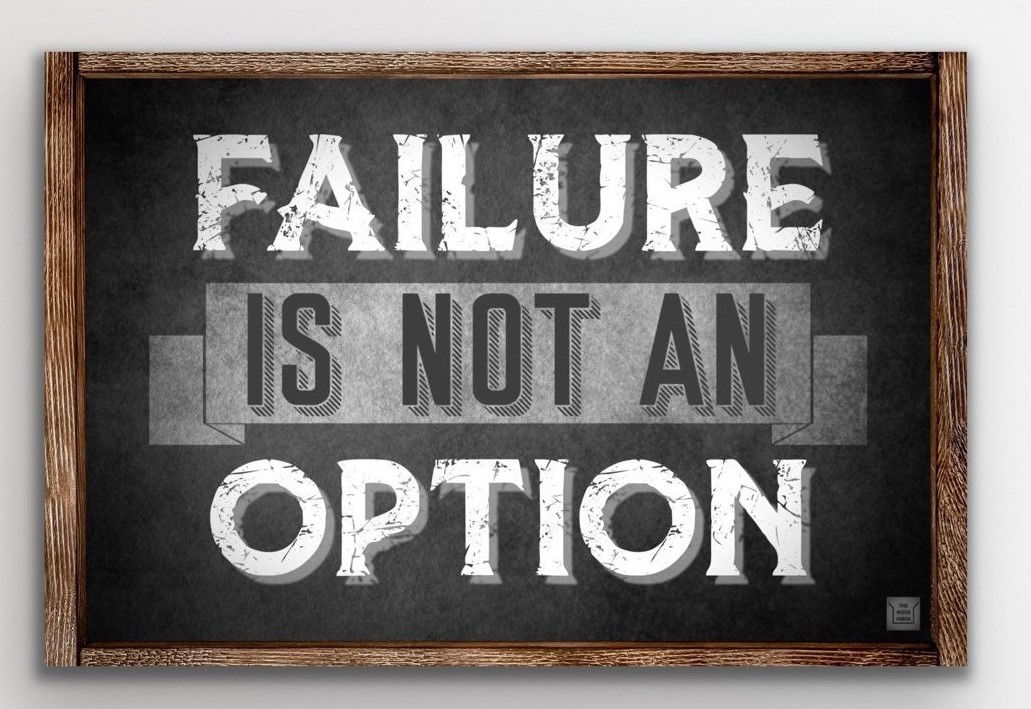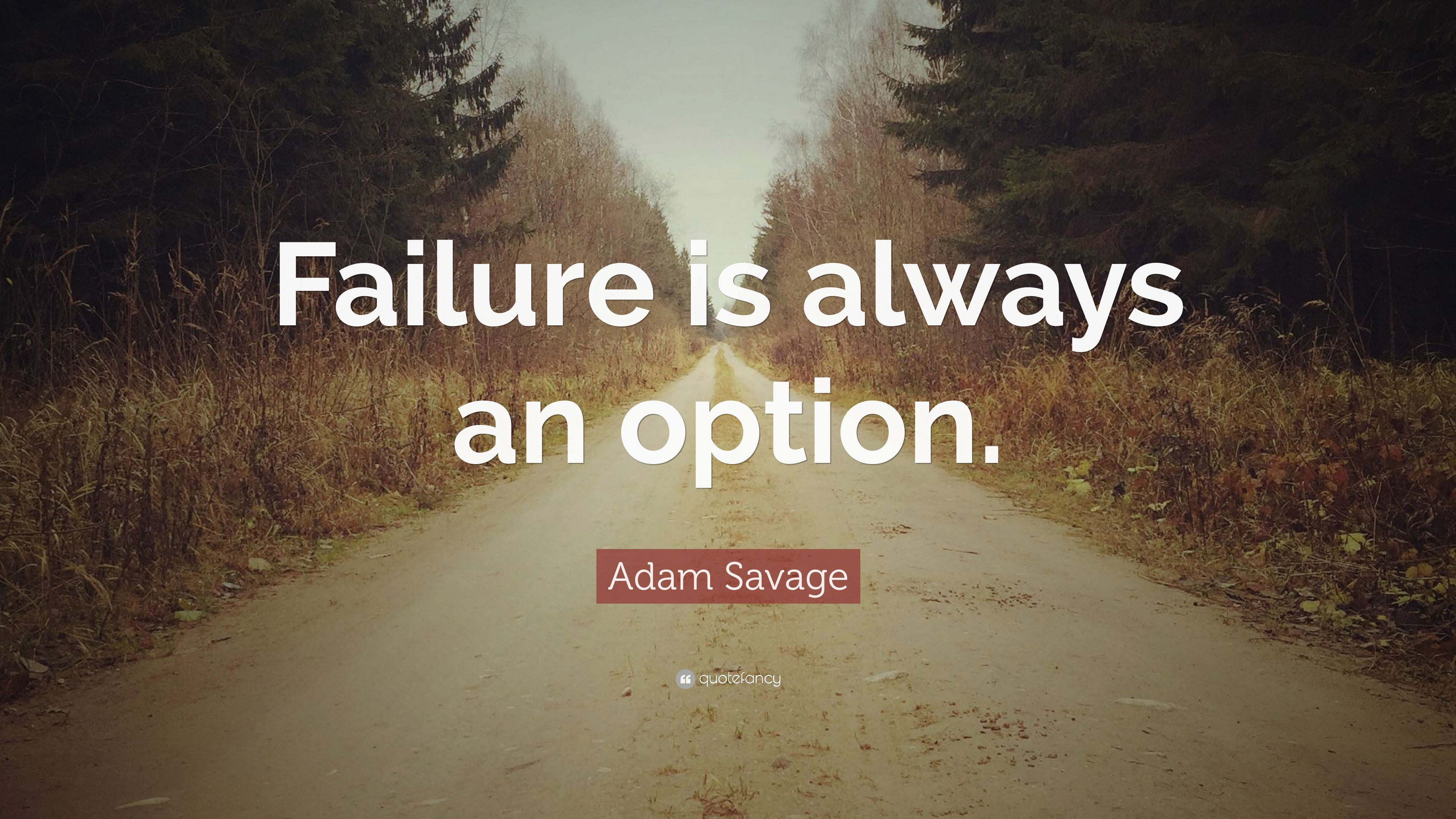Failing Intelligibly

I would characterize some of my main values and motivations as achievement and/or productivity, in the most basic and non-aspirational sense that I like to get stuff done. I will make a list that includes some of the most trivial errands because the visual of seeing a completed list provides a nice vibe of productivity. There's nothing admirable about my version of achievement or productivity, in fact I have a clear track record of poor decision quality just to feel like I'm getting something done, and I've got a house full of projects with various work-arounds to prove it. Getting it done often overrules getting it done well. An additional downside to such an achievement value or mindset is a negative reaction to failure -- it feels like a setback, time that's been wasted, and further from a desired achievement than when I started -- unless we do some self-regulation to think about failure in a more healthy way.
In prep for this post, I did an initial Google search for some sources about failure, and the results included a few sites where you can buy inspirational-looking prints and graphics with a message similar to the image below proclaiming Failure is Not an Option. Well that's quite the set-up for disappointment because as we all know, failure WILL happen.

The phrase has its origins in the 1970 Apollo 13 moon landing when an oxygen system rupture threatened the three astronauts on board. The line itself was not actually uttered during the mission, but it was included in the 1995 film about the events, and the phrase has been attached to the actual event since.
Certainly when we're talking about saving lives, failure is not an option is a pretty good mindset. But life-saving scenarios are arguably one of few scenarios where we should think of failure that way. For air traffic controllers, roller coaster engineers, and lion tamers, the stakes for failure are pretty high. But for most of us, failure is tolerable.
I used to teach a course about the role of non-profit organizations in conservation, digging into what they are, how they operate, and their niche in protecting our natural places. I had a few class sessions about accountability and transparency, two concepts that are part of standard non-profit vernacular. "Accountability" refers to the extent to which organizations own up to and explain their successes and failures; "transparency" is the accessibility of those outcomes and reflections to audiences external to the organization.
The class was typically 30-40 students, and we would collectively scour the websites, annual reports, social media posts, and other communication materials from organizations, looking for examples of how they communicated their successes and failures. Predictably, after the 30-40 of us collectively reviewed the websites of dozens of organizations, we usually found plenty of examples of success, and few, if any, examples of failure.
Prior to the beginning of this section of the course, I asked students to write down the first three words that came to mind with the word "failure." For years in this class, by a more than 2 to 1 margin, negative words such as "shame," "disappointment" and "defeat" outnumbered healthier words such as "learning" or "normal."
From there, it's a pretty simple hypothesis about why we found so few examples of failure in the materials of conservation non-profits: if we think of failure alongside shame and defeat, we would likely be hesitant to publicize our shortcomings to stakeholders and donors.
Yet, just about anyone with a few years on this planet have enough life experience to agree that life WILL have some failures. It's inevitable. I don't think anyone would suggest you can go through life failure-free, so it seems logical that the same would be true of organizations; organizations are just run by humans, afterall. And, innovation and risk-taking -- concepts needed for society to continue to advance -- need failure as part of a journey to create processes, structures, technology and the widgets of stuff that improve lives, communities and economies.
The class discussions about failure felt unsurprising in some instances -- after all, no one likes to fail, so some of the negative connotations make sense. But our discussions had moments that were also troubling: students felt both external and internal forces telling them to avoid failure, but we could rarely come up with definitive ideas on what's behind all of the fear avoidance messaging. That lack of clarity can lead a to a sense of powerlessness.
What a strange paradox, that we attach shame and disappointment to something we know is going to happen. Why can't we just chalk it up nonchalantly to a day of life on the planet. Logically, it seems to me, a strong commitment to the belief that we know failure is in our future would help neutralize failure's impact when it occurs, like we wouldn't be as caught off-guard emotionally when it occurs.
What I learned after digging in to the topic is the paradox exists in part because failure doesn't happen enough for us to have a more mild "just a part of life" reaction. As an analogy, I'm probably going to get stung by a bee several more times in life, and even with this anticipation it doesn't mean the reaction to a future bee sting will be ambivalence. When it happens, it's novel and that ratchets up the emotional reaction. Maybe if I got stung every day, I would react less. This is probably true for bee keepers.
Granted, this bee analogy isn't exactly apples to apples, because it also physically hurts. Let's try a sunrise.
Most of us don't feel much of anything when the sun comes up every day when we're home; it's just part of a typical day. But if you're living above the Arctic Circle in Barrow-Utqiagvik, Alaska, you probably feel some something intensely positive -- excitement, relief, joy -- when the sun comes up for the first time in 67 days at the end of Winter. Failure is similar to that first sunrise in Barrow-Utqiagvik; when it occurs, it's novel and feels unfamiliar. In the case of the sunrise, the emotions behind our reaction are favorable. But for failure, it opens the emotional door for shame, disappointment and other unwelcome feelings to enter.
So one "solution" would be to fail more, and remove the sting of failure by getting used to it. It's probably not the greatest work-around for lessening the sting of failure, but I"m thinking of some fun options to integrate into my days to prepare me for future failure: play some pick-up basketball, sew my own clothes, enter a pop culture trivia competition. I'll be SO ready for failure.
What can we do about failure, for real? Looking into this, I was drawn toward Dr. Amy Edmondon's work. She is a professor at Harvard Business School, and is extensively published on the topic in research journals, books and the media, the latter typically including a translation of her academic research into tangible and actionable real-world guidance. I found her work to be tightly packaged and easily understandable.
A common first step is to do the patient and hard work of reprogramming our brains to think about failure differently. Deconstructing years or decades of a belief system that "failure should be avoided" doesn't happen easily, so this is a long-term goal. We need to periodically tell ourselves, our teams, our students, and loved ones that failure is a part of life, and especially do so in non-failure moments so the advice doesn't seem cliche or reactive in the moment. The repeated refrain that failure is normal can help minimize, but not eliminate, disappointment and shame when failure occurs because we've primed the brain to not overreact. It's your Stuart Smalley (google it, young'uns) moment every morning in the mirror: hey self, it's okay to fail today.
In addition, when we debrief events, programs, and milestones in work and life, we should ask what worked and what didn't work, and treat each with the same energy and emphasis. Put failure right in there as a normal and "just the facts" part of the discussion. Eventually, the new belief about failure will replace the old one.
Second -- and we all know this -- embedded in failure is an opportunity to learn. So an additional tip is to frame failure first and foremost as a learning opportunity, not a reflection of competence or looking for who to blame. But it's not enough to generically ask ourselves or our groups "what can we learn from this?" That's too vague and lacking strategy. Dr. Edmondson established a spectrum of failure that I will characterize as spanning from "good" failure (failure experienced via unknowns, such as trying to uncover new knowledge, technology, advancements via pilot tests, iterations, inventions) to "bad" (failure that was within our control but occurred due to carelessness, lack of attentiveness, etc). She suggests that post-failure reflections and discussions integrate this type of nuanced understanding of failure. For example:
- Was failure the result of a lack of skills or knowledge among the team? Implication: professional development, team composition.
- Were we inattentive to details or processes? Implications: clarity in roles, attention to detail.
- Did our own processes inhibit success? Were our plans actually conducive to achieving our desired outcomes? Implications: adaptability, assessing old processes and ways of thinking.
- Was there too much complexity, too many moving parts to coordinate? Implications: simplify, de-bundle, and iterate
- Were there unforeseen events or circumstances? Implications: culture around uncertainty and tolerance for risk.
- Was there uncertainty that could have been known? Implications: preparation, anticipating and accepting failure as a possible outcome at the onset.
There is also guidance to "preflect" before a project about what happens if we fail at an upcoming program, initiative, or whatever we're doing. If we play out that scenario, in many cases we realize the consequences are tolerable, not really that bad. In my era as a nature center director, we got used to trying out new ideas, not always knowing if there was an actual demand for them. Sometimes we just had to try it out, and worst case, no one or only a few people showed up. In the short term, maybe there's some embarrassment or disappointment, but that runs its course within a day or two. There were no long-term consequences, and we added to our understanding about what the community wanted (or didn't want, in this case).
In the sources I read, nothing suggested we can entirely eliminate the cruddy feelings that accompany failure, but we have some control over their intensity and impact if we frame failure as a normal part of life, play out the "what if" scenarios to understand the potentia implications if failure occurs, and let the emotions settle after failure and then take the time to reflect about it intelligibly.
"Fail intelligibly" was the phraseology used in a few pieces of Dr. Edmondson's work. The phrase, to me, is a little self-helpish or something that reminds me of a positive thinking poster from the 1980s, but I think the essence is treat failure like the fact of life it really is, strategically learn from it, and move on.
Onward we go, living, succeeding often, and once in awhile failing intelligibly.

Page header image credit: www.jooinn.com